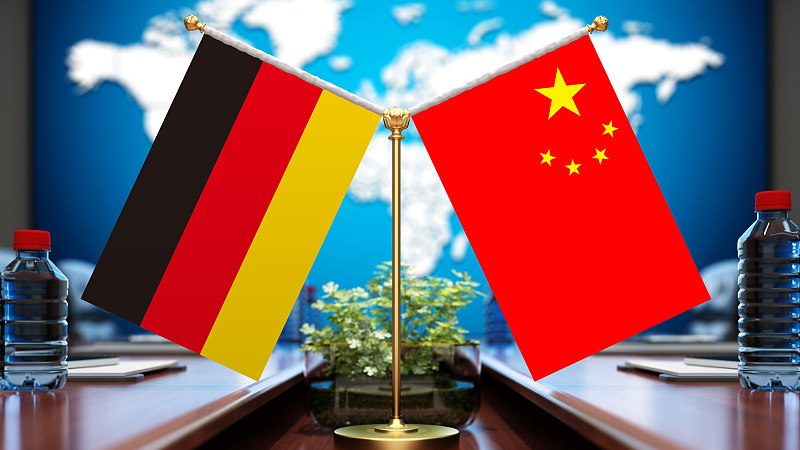
Editor's note: Thomas O. Falk is a London-based political analyst and commentator. He holds a Master of Arts in international relations from the University of Birmingham and specializes in U.S. affairs. The article reflects the author's opinions and not necessarily the views of CGTN.
Today, October 11, marks the 50th anniversary of Sino-German diplomatic relations. Since October 11, 1972, unprecedented development and exchange have occurred between both nations, built on pragmatism, respect and success. Many more years are yet to come.
Germany and China have witnessed eventful past five decades. While the latter has achieved almost unprecedented success in developing, modernizing and growing its economy, Germany was reunified just before the end of the Cold War and has remained the engine of Europe to this day.
While circumstances may have changed over time, various constants have remained present to date: respect for one another and an inimitable pragmatism that has allowed both nations to establish a recipe for success and, despite differing opinions in some areas, a seemingly unshakeable foundation for continuing cooperation over these next decades.
This unshakable foundation between Berlin and Beijing did not merely occur. It is rather the result of genuine dedication on both sides. Since October 11, 1972, countless visits between both established mutual political trust. Both Chinese and German leaders quickly realized how meaningful relationships should be with one another. The result has been frequent visits that had long been a rarity in China's relations with Western countries.
Over the past 20 years, both witnessed yet another quantum leap in cooperation. In 2004 both set up a "partnership with global responsibility" and created a mechanism for the annual meeting between the two countries. In 2010, Berlin and Beijing decided to comprehensively promote the strategic partnership and agreed to set up regular government consultations until finally arranging a comprehensive strategic partnership in 2014.
One look at the number supports the claim that Sino-German relations have known only one direction, namely forward. When diplomatic relations were established in 1972, the trade volume between the two was less than $300 million. Today, it's around $235.1 billion, a third of all of China's trade with the European Union, which comprises 27 nations.

Members of Burg Chinese Chorus perform during the cloud concert to celebrate the 50th anniversary of diplomatic relations between China and Germany in Essen, Germany, September 10, 2022. /Xinhua
Members of Burg Chinese Chorus perform during the cloud concert to celebrate the 50th anniversary of diplomatic relations between China and Germany in Essen, Germany, September 10, 2022. /Xinhua
Unsurprisingly, China has remained Germany's largest trading partner worldwide for years. On the other hand, Germany is the EU's primary investor in China.
But the connection is more profound than mere economics. Cultural exchange has always been a top priority. More than 500 universities and research institutes in both nations are now cooperating. With more than 50,000 students, the Chinese now form Germany's largest group of international students. More than 300 primary and secondary schools in Germany now offer Chinese courses, and 19 Confucius Institutes are active throughout Germany.
In a world with various challenges, Beijing and Berlin also work closely together on the global stage to maintain international peace. Both countries are committed to multilateralism and thus favor international cooperation instead of obsolete bloc politics. Both Berlin and Beijing prefer peaceful political solutions to global and regional disputes and take the climate challenge seriously.
In May, Chinese President Xi Jinping emphasized during a video call with the then-newly elected Chancellor Olaf Scholz that Sino-German relations have prospered for over five decades through the continuous deepening of practical cooperation development and success for both sides. Scholz, who, like his predecessor Angela Merkel is a pragmatist, knows about this connection and both sides' benefits. Despite the sabre rattle of Scholz's coalition partners, there seems to be no turning back in the partnership. That's good and right.
Disagreements between China and Germany have always been addressed. But the fact that Sino-German relations have reached today's level is also inseparable from the mutual political respect and trust, economic complementarity and win-win cooperation between both nations.
It is a valuable experience and ought to set an important principle for international relations that must also apply for the next 50 years and beyond.
(If you want to contribute and have specific expertise, please contact us at opinions@cgtn.com. Follow @thouse_opinions on Twitter to discover the latest commentaries on CGTN Opinion Section.)